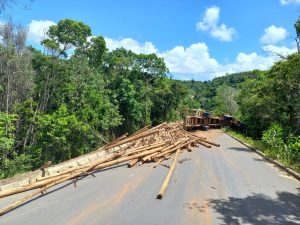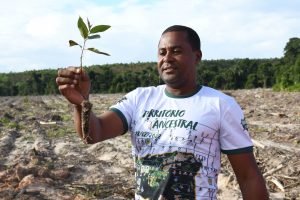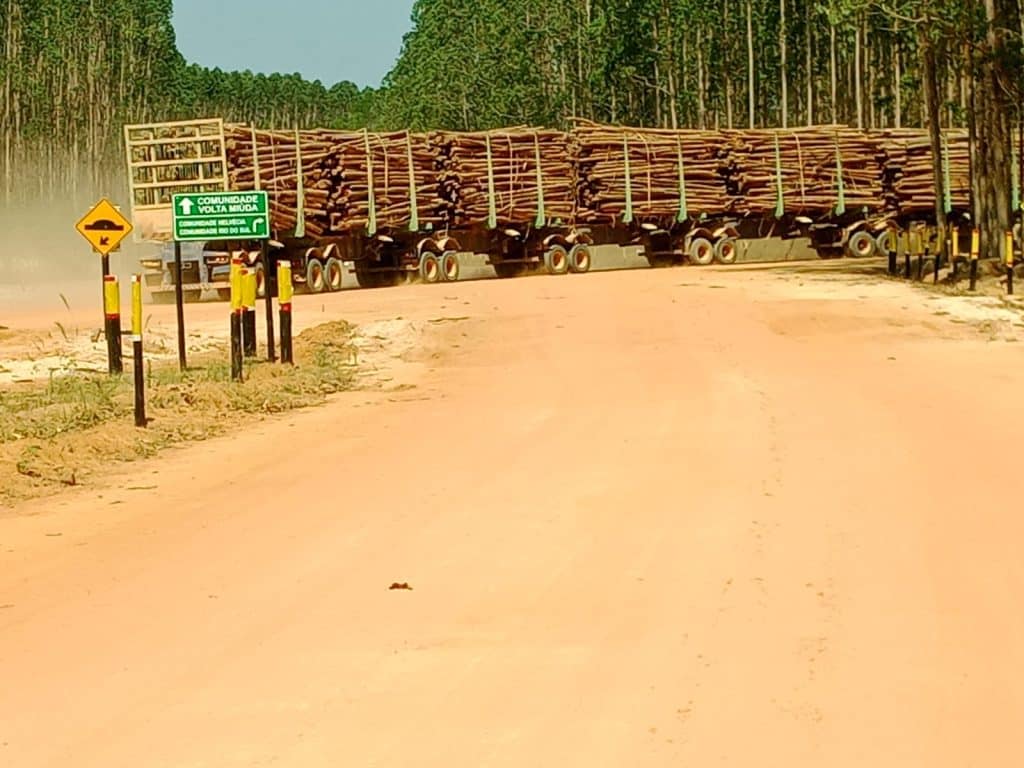Solidarity with communities impacted by eucalyptus tree plantations in Brazil
In May/June 2023, staff of the Canadian Biotechnology Action Network participated in an international strategy meeting in Bahia, Brazil, to discuss the challenge of genetically engineered trees. The meeting was accompanied by visits to Quilombola, Indigenous and peasant communities that are facing the expansion of eucalyptus tree plantations, in the states of Espirito Santo, Bahia, and Mato Grosso do Sul.
· Read our article “Brazil’s ‘Green Deserts’”
· Read “What you need to know about Suzano Papel e Celulose” by the World Rainforest Movement
· Read the summary “Danger: GE Trees” by the World Rainforest Movement
· Read the details about GE trees, and the impacts of plantations, in CBAN’s report “The Global Status of Genetically Engineered Tree Development”
The impacts of monoculture eucalyptus plantations

On March 19, 2024, a logging truck overturned and killed a community member walking on the road in Quilombo Helvécia.
Indigenous territories and lands settled by Quilombola have been grabbed for eucalyptus tree plantations – and the expansion is not over. The industrial plantations of the largest pulp company in the world, Brazilian company Suzano, surround and cut off many small farming communities. They exhaust local water sources and expose people, crops and farm animals to pesticide spray. Eucalyptus tree plantations have dried up streams, rivers and even lakes in territories where land rights are disputed. The plantations replace native forest, and support no animal life except for eucalyptus pollen that feeds bees.
World Rainforest Movement: Suzano continues with its destructive actions in the territories of quilombola, peasant and indigenous communities. Eight quilombola communities in Bahia state, Brazil, which for years have had their territories invaded by Suzano’s eucalyptus plantations, are crying out for help. We ask that you support the urgent demand (January 2023) by these communities that the Brazilian authorities take steps to immediately halt the illegal destruction of the Atlantic Forest and of these communities’ traditional paths by Suzano and its new road works, thus worsening the destruction and invasion of the territories of these communities. This violence in the communities is taking place right after Suzano received a US$725 million loan from the World Bankl/IFC (December 2022) to build a new pulp mill in Brazil. This occurred despite the protests against this decision by countless Brazilian and international organizations. They denounced the devastating impacts of the monoculture model of eucalyptus production for paper and pulp practiced by Suzano in Brazil.
Many community leaders have met violent deaths in conflicts over land and rights:
- On January 21, 2024, 200 landowners and members of a police militia coordinated an armed attack on the Pataxó people. One of their leaders was killed and her brother was seriously wounded by gunfire. The violence stems from land disputes and resource exploitation. Read the article from Rainforest Rescue: “Brazil: Mob of 200 landowners and police militia kill Pataxó Indigenous leader”
- On Aug. 17, 2023, Maria Bernadete Pacífico, a 72-year-old Quilombola leader of the Pitanga dos Palmares quilombo in Bahia state, Brazil was shot by two men wearing helmets who entered her home. Throughout her life, she denounced threats by land-grabbers seeking to invade their territory, illegal logging in their Atlantic forests and petrochemical pipelines passing through the community. Read “Son of slain Quilombola leader will still strive for community’s rights” by Jenny Gonzales, September 2023
Spotlight: Volta Miúda

Quilombola leader, Célio Pinheiro Leocádio, of Volta Miúda explains some of the impacts of eucalyptus tree plantations.
CBAN staff visited the quliombola community of Volta Miúda, one of many quilombos suffering the impacts of territorial encroachment by eucalyptus tree plantations that dry up local water supplies, result in pesticide exposure, and reduce biodiversity. Plantation logging also means the expansion of roads across traditional territories. In 2024, a logging truck tipped over and killed a resident of in the nearby Quilombo Helvécia. This followed the death of a community member of Volta Miúda when Suzano was building a new bridge on the only road to the community.
- Watch Quilombola leader, Célio Pinheiro Leocádio, Volta Miúda explain the problem of eucalyptus, and their resistance, as the plantation is harvested behind him: Watch here – 1.47 minutes
Take Action
Support communities against industrial tree plantations (2024): Sign the petition to support their demands.
Read the key demands heard from communities in Brazil.
Read the letter to the Prime Minister of Canada from the National Farmers Union and CBAN RE: Request for communication to the Brazilian government on eucalyptus plantations March 4, 2024.
Testimonials
Hear the leaders of the Angelim II quilombolo talk about how pesticides applied on eucalyptus plantations keep them from selling their crops as organic. Watch here – 1.26 minutes.
MST peasant movement leader in the state of Espirito Santo describes how Suzano dominates the area, and how they resist by producing healthy food on the land. Watch here – 3.35 minutes
Read the interview with Célio Pinheiro Leocádio, president of the Volta Miúda Quilombola Association, in the municipality of Caravelas, Extreme South of Bahia, Brazil – by the World Rainforest Movement, June 2023.
Watch the National Farmers Union event “Resisting land grabs for eucalyptus plantations in Brazil” October 26, 2023.
On June 22, 2022, a group of nearly 200 Indigenous Pataxó people occupied a eucalyptus plantation inside their demarcated territory in Brazil’s Bahia state, setting fire to the trees. Read the article, “With plantation takeover, Brazil’s Indigenous Pataxó move to reclaim their land” or watch the video of their testimonial. “We are expelling the multinationals, the millionaires and billionaires from here, There won’t be a single eucalyptus tree left on our sacred land, because that’s bad. We want our water, quality land, and our biome recovered. We do not accept this shameful destruction.”
Impacts of logging on communities
Watch the video testimonial (2023):
Suzano Paper and Pulp.
We can’t get by.
Because the company needs to work this way, like this.
Tell me if this is right.
It’s an abuse.
It’s a slap in the face to society.
So, what can you tell me?
Suzano Paper and Pulp.
This is what it does here, inside the quilombola communities in the far south of Bahia.
Now I say to you: Is this right?
It’s the only road the communities have access to here.
So, what do you have to say to us about this?
All the authorities responsible for inspection.
Look at the size of the pile of wood.
The trucks will soon pull up here and we’ll have no access.
That machine is there.
It’s parked in the road and we can’t get by.
So, what can you tell me? Please.
– Célio Pinheiro Leocádio, Volta Miúda






